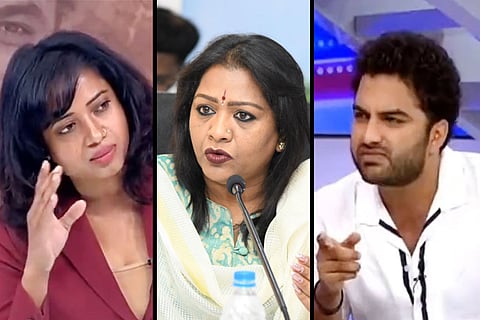

A tweet by Hyderabad Mayor Vijayalaxmi Gadwal condemning words spoken by actor Vishwak Sen against TV9 anchor Devi Nagavalli has stoked a debate about who is actually to be blamed for the whole row. The Mayor took to Twitter to slam the actor's actions and condemned his words. “...No amount of anger or frustration should trigger such words against women. Such action will not be tolerated. Vishwaksen should Refrain from making such heinous comments (sic),” she said. The Mayor’s tweet has evoked a barrage of responses from netizens pointing out that the TV9 journalist was also equally responsible for the war of words that broke out inside the channel’s studio.
The Mayor is referring to a controversial video from a debate on TV9 about a prank video created as part of the actor’s movie promotions, the anchor was debating whether the prank was appropriate. The actor is heard objecting to the journalist Devi Nagavalli referring to him as a “depressed person” and “Paagal Sen” (referring to his recent film Paagal), insinuating that he was in poor mental health and had made the prank video as a result. Devi then asked him to “get out” of the studio, to which the actor replied, “F***ing you guys called me, I am least interested in being in your studio,” even as Devi continued to shout at him, asking him to leave.
While many felt the journalist provoked the actor, others supported the actor saying he had later apologised for the abuse he had used on air. As the Mayor mentioned that such words cannot be used against women, many netizens questioned whether a woman was allowed to provoke and attack a man. One of the men on Twitter asked, “Just because she is a woman she can insult a guest who is also an established actor in our state… One should consider both sides.” Another netizen also suggested to the Mayor that she should concentrate more on civic issues rather than comment on such controversies.
The entire issue began with a ‘prank video’ set up by Vishwak’s team to promote his upcoming film Ashoka Vanamlo Arjuna Kalyanam. A man named Lakshman Tekumudi, who is popular on social media for his movie reviews, blocked Vishwak’s car, threatening to immolate himself unless the actor’s character from the film, Arjun, gets married. This was a reference to the plotline of the film, which depicts Vishwak’s character as a bachelor struggling to find a partner.
Every time TV9 thinks it can call people names and get away.
— MIRCHI9 (@Mirchi9) May 2, 2022
The shoutings of the Anchor is a result of shock and disbelief that some one said NOpic.twitter.com/Tu1YqCzeyX
With the prank video going viral, TV9 conducted a debate on it, with the journalist and some guests, including an advocate, alleging that such prank videos were harmful and a bad influence on youngsters, and calling them ‘acts of madness.’ The journalist, Devi Nagavalli, argued for booking cases against everyone who does such pranks. An advocate named Arun Kumar, who was part of the debate, has even approached the State Human Rights Commission to register a complaint over the prank video involving Vishwak.
Vishwak later apologised for using the f-word in the journalist’s presence, insisting that he hadn’t done anything wrong apart from that. He told NTV that his team had decided to pull off the prank near his residence. He insisted that no ‘nuisance’ was created and that Lakshman had merely used water, not petrol. The video shows the actor and others around Lakshman laughing while trying to stop him. “If anyone was inconvenienced in the neighbourhood, the complaint should come from them. These people cannot complain on their behalf,” he said.
Babu Gogineni, who identifies as a humanist, rationalist and human rights activist and a popular name in the Telugu states took to Facebook to demand an apology from Devi Nagavalli. In a long post he put forward his views on what had transpired. “...This is a scandal. It is even more than a scandal that she can get away with this without public admonition or punishment from her employers.” He also added in his post, “Such bad behaviour cannot be called journalism.”